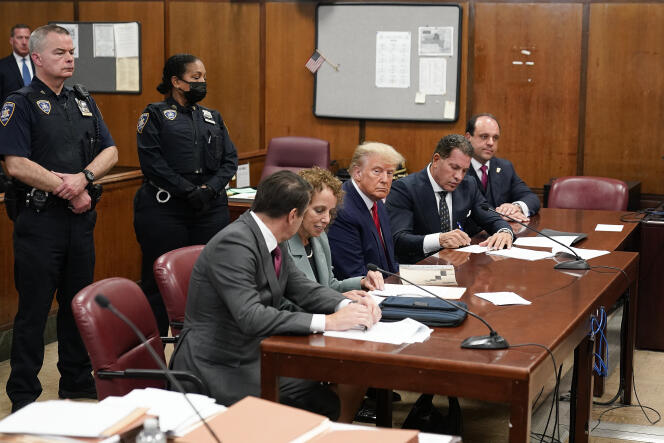


There have been so many appeals, delaying tactics and outraged press releases from Donald Trump over the past three years to delay the deadline. So many months lost and detours taken by the justice system, sometimes fueling the feeling of special treatment given to the former leader. However, on Monday, April 15, the unimaginable will happen: The 45th president of the US will sit in the dock in a New York courtroom, like an ordinary citizen, in a criminal trial.
No one knows what will come of it, nothing will be crystal-clear because the timetables are intertwined. Both a candidate and a defendant, a former president aspiring to become one again in less than seven months, Trump suffers from this confusion of statuses as much as he plays on it. Confusion is even his primary strategy, as he, the supposed victim, has compared himself to Nelson Mandela, detained for 27 years, and to the Russian opponent Alexei Navalny, who died in prison.
Taking the country with him, Trump is about to plunge back into ancient times and into a case of debated strength: that of the 2016 presidential campaign, and his brief sexual relationship, 10 years earlier, with the porn film actress Stormy Daniels. Shortly before the election, he sought to prevent its revelation through secret payments via his former adviser and lawyer, Michael Cohen. Trump has been indicted in this case on 34 counts of falsifying business records. He pleads innocent.
The hearing will be presided over by New York Supreme Court Justice Juan Merchan. In his usual method of destabilization and stigmatization, Trump claimed that Merchan is biased, due to his daughter Loren Merchan's work as a Democratic political consultant. He even spread the rumor – devoid of any foundation – that Loren Merchan had circulated a photo montage of him behind bars.
The trial is expected to last around six weeks. It will begin with a meticulous selection of 12 jurors and six alternates. This is a crucial issue for both parties. Even the basic questionnaire designed to determine the profile of potential jurors was the subject of bitter negotiations. It concerned their place of residence; family and professional situation; hobbies; preferred media for information; involvement in groups or political movements; familiarity with the accounting issues at the heart of the trial and also of the Trump world; hostility or fervor toward the former president; and past proximity to extremist organizations, such as the Proud Boys militia or the QAnon conspiracy movement. The prosecution and defense will hunt down blatant or alleged bias. Trump's team objected to a question in the questionnaire: "Do you believe the 2020 election was stolen?"
You have 70.01% of this article left to read. The rest is for subscribers only.
